Conversion Rate Jumped from 0.2% to 1.3% & Weekly Orders Grew 4–5× — StepUp Coffee Shopify Case Study
A focused case study on transforming a sprawling dropshipping catalog into a coherent, resilient, and conversion-driven Shopify brand for StepUp Coffee.
How Webrex streamlined StepUp Coffee's product strategy, improved UX performance, and lifted conversions with a brand-first approach.
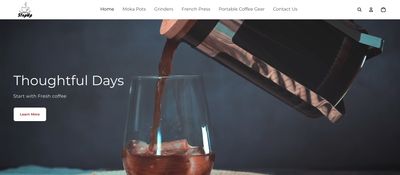
Brand context & identity
StepUp Coffee began with warmth and intention—curating tools for slower, more thoughtful brewing. The founder is calm, rational, and minimalist. But the store had grown noisy and complex.
What we found
- 1,800+ product listings
- Mixed and competing product categories
- No unified visual language
- No central brand position
- No dominant product to drive identity or growth
What it meant
A brand with warmth and a founder with clarity—without an anchor.
Our mandate: reduce noise, restore coherence, and build a clear, defensible identity.
Clarity before scale
StepUp Coffee wasn’t failing — it was undefined. A warm brand without structure made decisions hard and growth harder.
Key Problems We Identified
Undefined Structure
No clear product hierarchy, no anchor product, and no guided decision path across 1,800+ listings.
Why ads underperformed
- No audience or funnel segmentation
- Broad, unfocused keywords
- Decisions not guided by data
- No tracking or attribution structure
- Spend went out, learnings never came back
What the store signaled
- 1,800+ listings with competing categories
- No guided path to a decision
- No anchor product to define the brand
The result
- ~0.2% conversion rate
- Unprofitable ad spend
- 0–1 orders per week
- No repeat purchase motion
- A quiet brand presence
What it meant
This wasn’t a media problem — it was a structure and identity problem. Before scale, we needed simplicity.
Our first step: reduce complexity, define the product hierarchy, and build a brand‑led path to purchase.
What this looked like in practice
A confusing catalog and undefined brand positioning slowed decisions and suppressed profitability. Our focus shifted to simplifying choices, defining a hero narrative, and building a brand-led path to purchase.
Less, but better
StepUp Coffee didn’t need more — it needed fewer and better choices. Scaling chaos only compounds it; first we align the foundation, then we scale what works.
Brand Clarity
Focus: Identify what the brand stands for. Objective: Remove noise and express intention.
Conversion Architecture
Focus: Optimize the store experience. Objective: Make the path to purchase effortless.
Profit & Scale Systems
Focus: Rebuild sourcing and ads. Objective: Ensure growth is financially sustainable.
Structure first. Systems next. Scale last. Always in that order.
Redesigning the Product Universe
From clutter to a curated core — refocusing the catalog around what customers reliably choose and love.
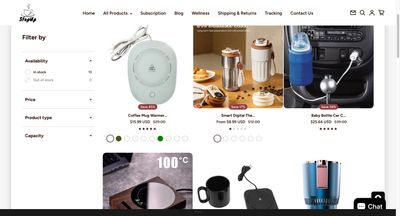
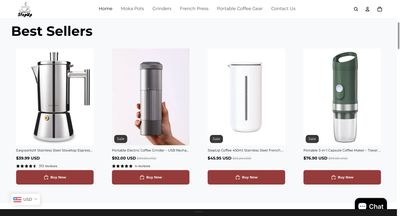
We analyzed
Search Intent Patterns
What customers actually search for when looking for coffee products.
Product Engagement Heatmaps
Which products customers interact with most often and for how long.
Add-to-Cart Correlations
Combinations and features that drive the highest conversion rates.
Cost-Per-Click Distribution
Which categories command premium advertising costs — and why.
Conversion Tracebacks
Mapping the journey from discovery to purchase across touchpoints.
And one insight was undeniable
A single Moka Pot consistently attracted higher‑quality engagement — quiet, reliable, repeatable purchasing intent.
This product held
Design permanence
Daily emotional use
Compatibility with the founder’s calm brand philosophy
A Strategic Decision
Choosing a clear center of gravity
So we made a strategic decision:
StepUp Coffee would not be “a store.”
It would be a brand built around slow brewing rituals.
What this decision created
The hero SKU
A flagship product that concentrates value and momentum.
The direction-setting identity anchor
Design, tone, and ritual that signal where the brand is headed.
Foundation for creative messaging and offers
Clear narratives and offers built around the ritual‑centric promise.
Every strong brand has a center of gravity. This became StepUp Coffee’s.
Conversion Optimization — Designing for Ease, Not Persuasion
We redesigned the Moka Pot page to reduce friction and elevate emotional clarity. The goal: effortless understanding, effortless choice.
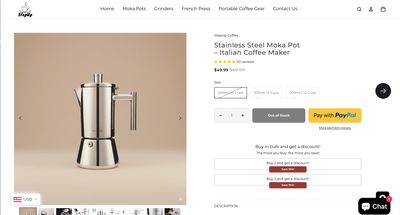
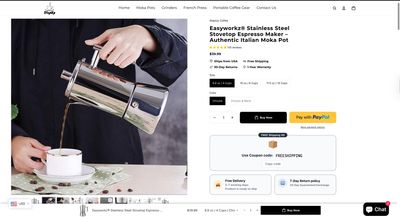
What We Changed
- Simplified layout with precise typography and generous negative space
- Replaced generic shots with warm, morning‑light lifestyle imagery
- Crafted copy focused on ritual, not features
- Added discreet trust markers (not loud badges)
- Introduced return & shipping clarity above the fold
- Structured benefit blocks with visual rhythm
- Reduced cognitive load using minimalist iconography
- Clear primary action with supportive secondary actions
Resulting Behavior Shifts
- Visitors slowed down instead of bouncing
- Time on page increased by +80%
- Bounce rate dropped below 40%
- Conversion rate rose to 1.3%+ (from ~0.2%)
Experiment Design
- Hypothesis: Ritual-first framing decreases decision fatigue and increases intent
- Variant: Simplified header, benefit-first copy, lightweight trust markers
- Metrics: Time on page, scroll depth, add-to-cart, conversion rate
- Outcome: Significant improvements with no usability regressions
UX Principles
- Show, then tell: Imagery sets context, copy confirms
- One primary action per view; others are supportive
- Reduce noise; increase rhythm and reading ease
- Clarity → comfort → confidence → purchase
No tricks. No urgency countdowns. No shouting. Just clarity → comfort → confidence → purchase.
Google Ads Rebuild — Clean Structure, Aligned Communication
From chaos to clarity: intent-first campaigns, message–market fit, sustainable ROAS.
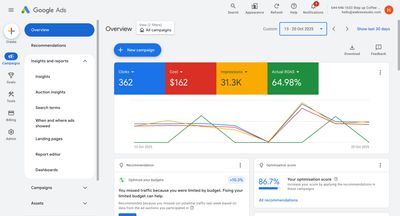
Rebuild Framework
Campaigns aligned to High / Mid / Protect tiers for clean routing.
Match‑type control and single‑intent ad groups for clarity.
Layered signals to bias toward qualified demand.
Ad copy mirrors brand tone and the landing page promise.
Negative lists and routing prevent cannibalization across tiers.
Performance Shift
| Metric | Before | After |
|---|---|---|
| CTR | Low & inconsistent | +67% improvement |
| CPC | Higher than needed | -22% reduction |
| Orders per Week | 0–1 | 4–5× consistently |
| ROAS | Unprofitable | Stable & scalable |
Experiment Design
- Hypothesis: Clean structure + aligned copy increases qualified clicks and reduces waste
- Variants: Intent-tiered campaigns, message harmonization, negative routing
- Metrics: CTR, CPC, orders, ROAS stability
- Outcome: Higher efficiency and consistency without discounts
Messaging Principles
- Intent-first: speak to the searcher’s job-to-be-done
- Consistency from ad to landing page
- No artificial urgency; earn trust through clarity
- Optimize for reading rhythm and comprehension
Campaign Architecture at a Glance
Exact + phrase, highest relevance, strict negatives, match copy to product jobs.
Broader discovery with guardrails, audience layering, query mining cadence.
Brand defense, competitor terms, performance max with exclusions and budgets.
Routing enforced with negatives across tiers to prevent cannibalization and protect budget.
Traffic stopped being “visitors” and became qualified, aligned buyers. No discounts. No gimmicks. Just clarity, structure, and message–market fit.
Supply Chain & Pricing — The Structural Breakthrough
The AliExpress supplier cost of ~$38 per unit prevented true scale.
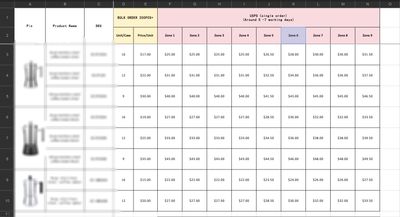
So we:
Outcome
| Cost Component | Before | After |
|---|---|---|
| Product Unit Cost | ~$38 | $25–$30 |
| Average Delivery Time | 10–18 days | 5–9 days |
| Customer Complaint Rate | Moderate | Significantly reduced |
This wasn’t just cost savings.
It was brand stability.
Margins became predictable.
Fulfillment became reliable.
Customer trust became repeatable.
The Result — A Brand With Direction
A calm, coherent identity anchored to product and founder — reflected across the system.
System Changes
Brand Positioning
Before
Undefined
After
Clear & emotionally coherent
Conversion Experience
Before
Confusing, cluttered
After
Minimalist, guided, calming
Traffic Quality
Before
Unqualified
After
Intent-aligned & consistent
Profit Margin
Before
Unstable
After
Sustainable + scalable
Order Volume
Before
0–1/week
After
4–5/week and growing
StepUp Coffee didn’t “blow up overnight.”
It became steady, grounded, and healthy.
Predictable
Calm
Directional
Scalable with intention
Exactly like the founder.
Exactly like the product.
Exactly like the ritual of brewing coffee.
Closing Reflection
This project wasn’t about hacks, funnels, or tricks.
It was about alignment:
Clarity is the strongest conversion engine.
And in the end — StepUp Coffee didn’t just grow.
It became itself.
Ready to turn clarity into conversions?
Partner with Webrex Studio for CRO, Speed, and Technical SEO.
Article by

Sanjay Makasana
CEO at Webrex Studio
Building data-driven Shopify growth engines, scaling D2C and B2B eCommerce brands from $1M to $100M.
